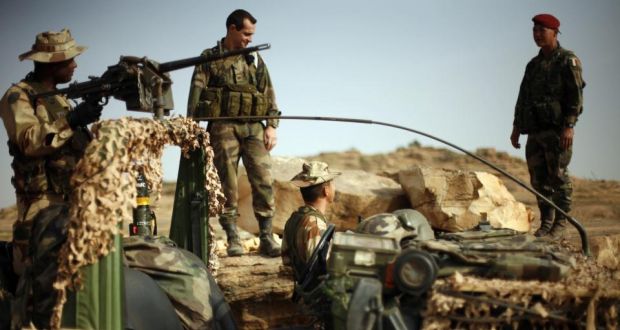Clashes between Mali forces and Tuareg separatists keep French troops from moving to fight Islamic militants in Sahel region
 French soldiers in Mali. Paris had hoped to move the force to target Islamist groups operating between southern Libya, northern Chad and northern Niger. Photograph: APJohn Irish and Marine PennetierFrance has delayed plans to redeploy 3,000 soldiers to fight militants across Africa’s Sahel region, saying it first needs to help deal with a fresh outbreak of violence in northern Mali.
French soldiers in Mali. Paris had hoped to move the force to target Islamist groups operating between southern Libya, northern Chad and northern Niger. Photograph: APJohn Irish and Marine PennetierFrance has delayed plans to redeploy 3,000 soldiers to fight militants across Africa’s Sahel region, saying it first needs to help deal with a fresh outbreak of violence in northern Mali.
Al-Qaeda repulsed France originally sent troops into Mali after al-Qaeda-linked Islamists took advantage of a Tuareg-led rebellion and seized control of the country’s north in 2012. A French-led military operation, known as Serval, drove them back last year.
After that intervention pushed the Islamists from major cities and towns, Mali’s government and separatist groups signed a deal in Burkina Faso’s capital Ouagadougou to hold talks about greater autonomy for the north. But little progress has been made since last year with tensions gradually rising.
A French military source said no new date had been set for the broader west African deployment, originally scheduled to be completed by the end of May.
At least eight Malian soldiers and eight civilians including six government officials were killed when rebels attacked the regional governor’s office in the northern town of Kidal on Saturday.
The army retook key positions in Kidal yesterday without fighting but rebels remain in control of a military camp and the governor’s office, a military source and a witness said.
“All the [army] reinforcements have arrived and they have taken control of all the strategic positions in the town except the governor’s office. We are just waiting for a political decision before moving on to the offensive,” said a senior military source.
French Defence Minister Jean-Yves Le Drian postponed a May 25th trip to Mali and Chad, where the new broader operation will be based.
He had planned to outline details of the mission that would operate across the Sahel region along the southern edge of the Sahara Desert, to fight Islamist militancy.
“There is an urgency . . . to restore calm in Kidal, because this must not derail the reconciliation process,” said a French diplomatic source.
Former colonial power After winning adulation across Mali for its
five-month military offensive, France has been caught in the middle of a diplomatic tussle between the government wanting to assert its control over the country and the rebels still demanding some form of autonomy in the north.
Both sides have accused Paris, the former colonial power, of not doing enough to promote their cause and of supporting the other.
“The situation could deteriorate but not to the extent of 2012, mostly because of the presence of foreign troops,” said Jean-Baptiste Bouzard, Africa analyst at risk consultancy Maplecroft.
“At the moment, they [the French] have decided to stay neutral but if France decides that the situation can’t worsen anymore, its army has the capacity to put an end to MNLA action,” he added.


